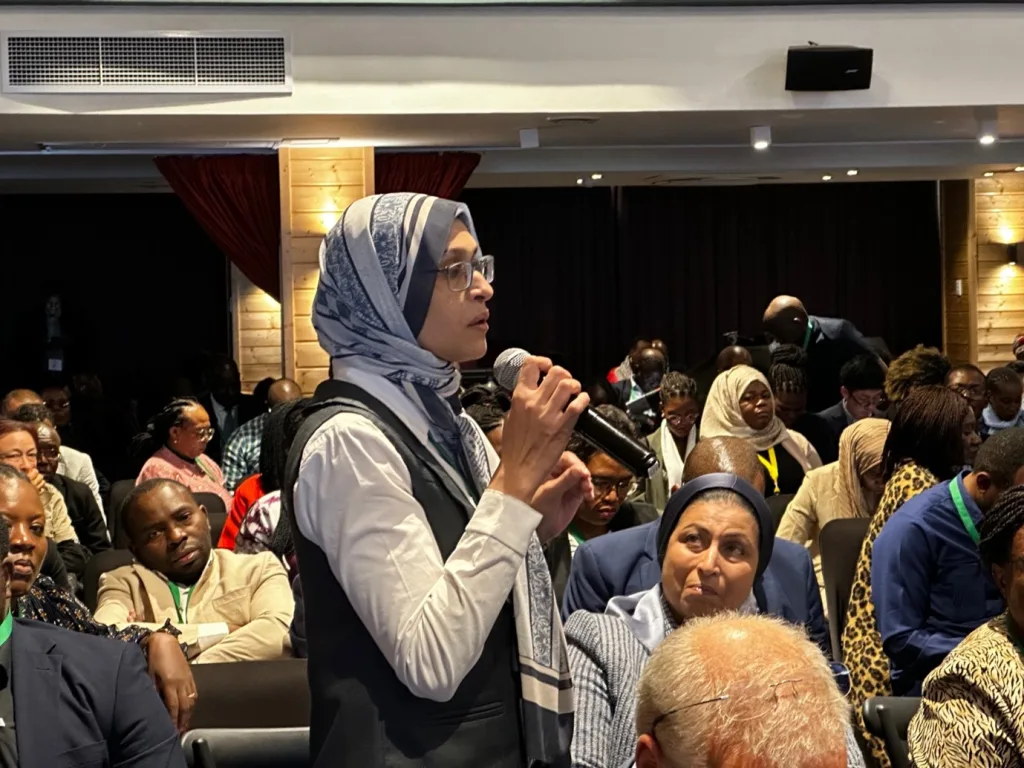Empowering Change in the Sanitation Sector – Insights from Local Authorities
The AfricaSan7 Conference continues to serve as a platform for driving transformative change in the sanitation sector, particularly in the sphere of local authorities’ critical role in implementation. Day 2 of the conference witnessed an enlightening plenary session highlighting the multi-sectoral approach essential for progress in sanitation. The session emphasised five key accelerators: financing, data and information, governance, capacity building, and technology and innovation, sparking discussions on initiatives beyond 2030.


Insights from Panel Discussions
Discussing the road to universal access, Namibia showcased measures, emphasising legal frameworks, revised water strategies, and substantial budget allocations across sectors to achieve universal access. On private sector involvement, Senegal highlighted the role of strong institutions and transparent responsibilities in involving the private sector, focusing on regulatory aspects, capacity building, and accountability. Zambia stressed innovation, discussing funding mechanisms, skills development, government cooperation, and technological challenges in the sanitation sector.
Governance’s Crucial Role and Notable Success Stories
The role of governance was emphasised, highlighting its interconnectedness with all accelerators in impacting the sanitation sector. Success stories from Kenya, Nigeria, and diverse regions like Burkina Faso, Tanzania, Egypt, Malawi, and Namibia showcased investments, partnerships, and executive support driving impactful change.
The session underscored that collaborative efforts, partnerships, capacity building, and innovative strategies are paramount to achieving the Sustainable Development Goals (SDGs) by 2030. Discussions also stressed the valorisation of costs related to purification stations, emphasising a circular economy approach.
Strengthening Sanitation Professionals: ‘Inspire’ and ‘SOS Programme’
The conference unveiled ‘Inspire,’ a groundbreaking capacity-building program targeting sanitation professionals, focusing on leadership, communication, and technical skills. With a bilingual approach and support from key partners, this initiative aims to bridge the gaps in knowledge and leadership. Notably, the program remains open to the public sector, civil society, and private entities, recognising the need for a holistic approach to solving sanitation challenges.
The ‘SOS Programme,’ a year-long initiative, emphasised the adaptation to technological advancements, regulatory frameworks, and economic aspects within the sanitation sector. The discussion revolved around the crucial role of the private sector and NGOs, stressing the importance of technical expertise, leadership, and advocacy skills.
Addressing Gender Equality, Youth Inclusion, and Social Aspects in Sanitation Policies
The session on gender equality, youth inclusion, and social aspects in sanitation policy underlined the need for policy harmonisation, evidence-based approaches, and promotion of women’s representation. Discussions highlighted AMCOW’s strategies, the engagement of civil society, and the imperative for evidence-based, gender-transformative practices in policy development.


Challenges and the Way Forward
Throughout these sessions, various challenges surfaced, including the need for broader accessibility through online training, language barriers, and refining partnership formats. The discussions emphasised the importance of refining approaches to ensure inclusive policies, harnessing technology and continuously adapting to the changing needs of the sanitation sector.
The AfricaSan7 conference continues to catalyse change in the sanitation sector. With dynamic discussions and collaborative insights, it aims to bridge critical gaps and foster sustainable solutions. As the event moves forward, the upcoming AFWASA event seeks to further this discourse, focusing on sanitation and water management. The cumulative efforts showcased at the conference underline the significance of collaboration, evidence-based decision-making, and innovative strategies to achieve impactful and sustainable change in the sanitation sector.
The Day 2 sessions at AfricaSan7 unveiled transformative initiatives, acknowledged challenges, and emphasised collaborative efforts across sectors. As the conference progresses, it remains a platform for effective exchanges, assuring a sustainable future in the sanitation sector. With initiatives like ‘Inspire’ and discussions on local authorities and gender equality, the drive for change and innovation remains at the forefront.
On the AfricaSan7 platform, relevant actors can continue to unite and collaborate to steer the sanitation sector towards achieving safely managed sanitation in Africa.
Stay tuned for more updates from AfricaSan7 and the continued efforts in advancing Africa’s sanitation and hygiene.
Disclaimer: We‘d like to point out that the information and initiatives shared are based on the latest sessions and discussions at the AfricaSan7 conference and may be subject to further developments and updates.

